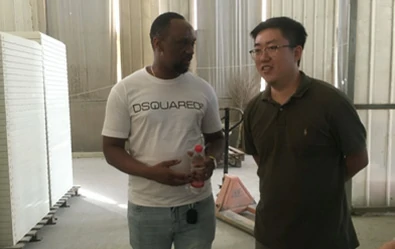loading...
- No. 9, Xingyuan South Street, Dongwaihuan Road, Zaoqiang County, Hengshui, Hebei, China
- admin@zjcomposites.com
- +86 15097380338
- Welcome to visit our website!
Advanced Composite Pressure Vessels for Enhanced Performance and Safety Solutions
Understanding FRP Pressure Vessels An Innovative Solution for Modern Applications
Fiber-Reinforced Plastic (FRP) pressure vessels are increasingly becoming a cornerstone in various industries, especially in situations requiring lightweight yet high-strength containment solutions. These vessels are designed to withstand high pressures and corrosive environments, driving their adoption in industries such as oil and gas, chemical processing, water treatment, and aerospace. This article explores the characteristics, advantages, and applications of FRP pressure vessels, highlighting their significance in modern engineering.
Characteristics of FRP Pressure Vessels
FRP pressure vessels are made from a composite of fiberglass strands and a resin matrix. This composition allows for the engineering of a material that is not only strong but also resistant to chemical degradation. The manufacturing process typically involves wound fiberglass layers around a core, creating a vessel that is robust yet lightweight. The choice of resin can vary based on application requirements, with options including vinyl ester, epoxy, and polyester, each providing distinct benefits in terms of chemical resistance and thermal stability.
The structural integrity of FRP pressure vessels is further enhanced by careful engineering of the winding patterns and layers, which can be tailored to meet specific load-bearing requirements. Thus, they offer flexibility in design that is not possible with traditional materials like steel or aluminum.
Advantages of FRP Pressure Vessels
One of the primary advantages of FRP pressure vessels is their excellent corrosion resistance. Traditional materials like carbon steel can corrode when exposed to aggressive chemicals, leading to potential failure and hazardous conditions. In contrast, FRP vessels can be designed to resist a wide range of chemicals, extending their service life and reducing maintenance costs.
Additionally, the lightweight nature of FRP materials makes them easier to handle and install compared to their metal counterparts. This characteristic is particularly beneficial in applications where weight reduction is critical, such as in aerospace and offshore platforms, where every kilogram saved can lead to significant cost benefits.
frp pressure vessel

Energy efficiency is another compelling reason for adopting FRP pressure vessels. Due to their insulating properties, they can help in maintaining the temperature of the contents within, minimizing heat loss and increasing overall energy efficiency in processes.
Applications of FRP Pressure Vessels
The applications of FRP pressure vessels are vast and varied. In the oil and gas industry, they are used for storage and transportation of chemicals and fuels, helping to ensure safety and integrity over long distances. In the chemical processing sector, their corrosion-resistant properties allow them to operate safely in harsh environments where traditional vessels would fail.
In water treatment facilities, FRP vessels are increasingly used for filtration systems and chemical storage, proving their resilience against chlorine and other corrosive agents commonly found in water treatment processes. The aerospace industry also employs these composite materials for fuel tanks and other components, taking advantage of their lightweight and high-strength characteristics.
Moreover, FRP pressure vessels are finding their way into renewable energy sectors, such as solar energy systems, where they are utilized for thermal storage, and in wind energy applications, where their weight savings contribute to overall system efficiency.
Conclusion
As industries continue to seek innovative solutions to enhance efficiency and safety, FRP pressure vessels stand out as a formidable option. Their unique blend of lightweight construction, excellent corrosion resistance, and versatility makes them a valuable asset in various applications. As technology advances, we can expect these vessels to become even more prevalent, paving the way for safer, more efficient industrial processes. In conclusion, FRP pressure vessels not only meet the demands of modern engineering but also contribute to sustainability and resilience in an ever-evolving industrial landscape.
-
The Rise of FRP Profiles: Strong, Lightweight, and Built to LastNewsJul.14,2025
-
SMC Panel Tanks: A Modern Water Storage Solution for All EnvironmentsNewsJul.14,2025
-
GRP Grating: A Modern Solution for Safe and Durable Access SystemsNewsJul.14,2025
-
Galvanized Steel Water Tanks: Durable, Reliable, and Ready for UseNewsJul.14,2025
-
FRP Mini Mesh Grating: The Safer, Smarter Flooring SolutionNewsJul.14,2025
-
Exploring FRP Vessels: Durable Solutions for Modern Fluid HandlingNewsJul.14,2025
-
GRP Structures: The Future of Lightweight, High-Performance EngineeringNewsJun.20,2025
